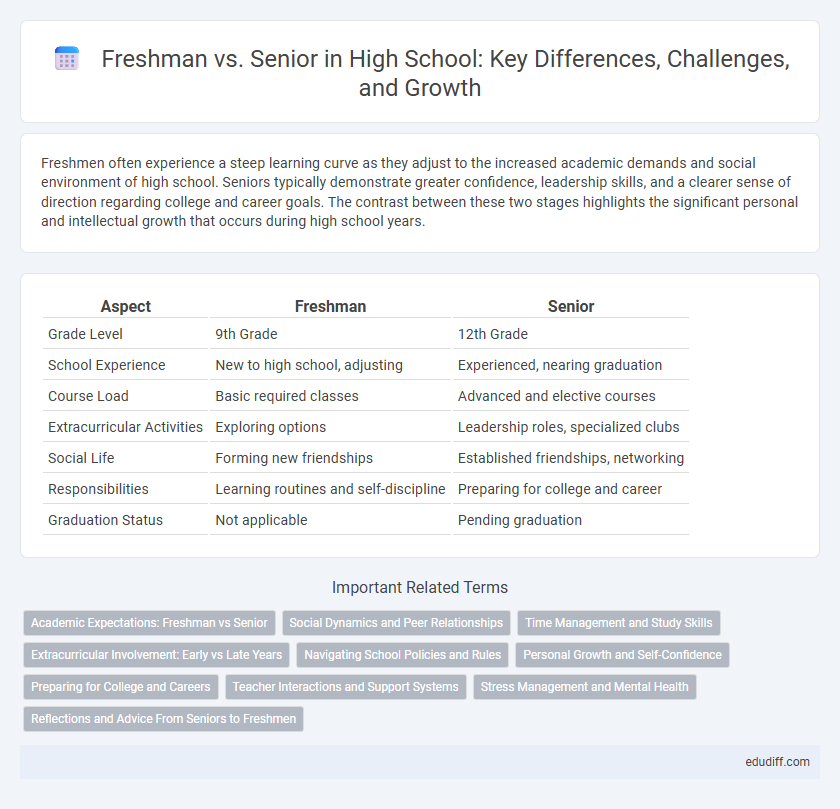Freshmen often experience a steep learning curve as they adjust to the increased academic demands and social environment of high school. Seniors typically demonstrate greater confidence, leadership skills, and a clearer sense of direction regarding college and career goals. The contrast between these two stages highlights the significant personal and intellectual growth that occurs during high school years.
Table of Comparison
| Aspect | Freshman | Senior |
|---|---|---|
| Grade Level | 9th Grade | 12th Grade |
| School Experience | New to high school, adjusting | Experienced, nearing graduation |
| Course Load | Basic required classes | Advanced and elective courses |
| Extracurricular Activities | Exploring options | Leadership roles, specialized clubs |
| Social Life | Forming new friendships | Established friendships, networking |
| Responsibilities | Learning routines and self-discipline | Preparing for college and career |
| Graduation Status | Not applicable | Pending graduation |
Academic Expectations: Freshman vs Senior
Freshmen are expected to build foundational skills in core subjects such as math, science, and English, with a focus on developing good study habits and time management. Seniors face higher academic expectations, including advanced coursework, college-level assignments, and preparation for standardized tests like the SAT or ACT. Senior students also manage capstone projects, internships, and college applications, requiring greater independence and critical thinking skills.
Social Dynamics and Peer Relationships
Freshmen often navigate social dynamics with uncertainty, seeking acceptance and forming initial peer connections, while seniors typically hold established social circles and exert greater influence within the school community. The contrast between freshmen's exploratory phase and seniors' consolidated relationships highlights the evolution of peer interactions over four years. This progression impacts students' confidence, social status, and overall high school experience.
Time Management and Study Skills
Freshmen often struggle with time management and study skills due to new academic demands and social adjustments in high school. Seniors typically develop advanced strategies such as prioritizing tasks, effective note-taking, and setting realistic goals, which increase productivity and reduce stress. These improved skills enable seniors to balance coursework, extracurricular activities, and college preparation efficiently.
Extracurricular Involvement: Early vs Late Years
Freshmen often explore various extracurricular activities to discover their interests, while seniors tend to concentrate on leadership roles or specialized clubs reflecting their developed passions. Early involvement aids skill-building and social integration, whereas later participation focuses on resume building for college applications. This progression highlights a shift from broad experimentation to targeted commitment in high school extracurricular engagement.
Navigating School Policies and Rules
Freshmen often struggle to understand complex school policies and must adapt to new rules, while seniors possess a deeper familiarity with institutional regulations and utilize this knowledge to navigate challenges effectively. School policies covering attendance, dress codes, and disciplinary actions require different levels of comprehension and enforcement depending on the student's grade level. Mastery of these rules directly impacts freshmen's ability to integrate and seniors' readiness for post-secondary environments.
Personal Growth and Self-Confidence
Freshmen often experience significant personal growth as they adapt to new academic challenges and social environments, laying the foundation for increased self-confidence. Seniors typically exhibit heightened self-assurance, shaped by years of overcoming obstacles and developing a clearer sense of identity. This progression from uncertainty to confidence highlights the transformational journey students undergo during high school.
Preparing for College and Careers
Freshmen begin building foundational skills through introductory courses and extracurricular activities that align with future academic interests, setting the stage for college readiness. Seniors concentrate on advanced coursework, college applications, and career exploration, utilizing resources like internships, job shadowing, and college counseling to make informed decisions. Engaging in these progressively tailored experiences ensures a smoother transition from high school to higher education or the workforce.
Teacher Interactions and Support Systems
Freshmen often receive more structured teacher interactions and targeted support systems aimed at easing their transition into high school, including orientation programs and regular check-ins. Seniors typically experience increased autonomy, with teachers providing mentorship and guidance focused on college preparation and career planning. Support systems for seniors emphasize advanced coursework assistance and individualized counseling to navigate post-graduation options effectively.
Stress Management and Mental Health
Freshmen often experience heightened stress due to new academic challenges and social adjustments, impacting their mental health more significantly than seniors. Seniors typically develop stronger coping mechanisms and stress management strategies, benefiting from accumulated experience and established support networks. Effective stress management programs tailored to these grade-specific needs can enhance overall student well-being and academic performance.
Reflections and Advice From Seniors to Freshmen
Seniors often reflect on the importance of time management and encourage freshmen to prioritize balancing academics and extracurricular activities early on to reduce stress. They advise building strong relationships with teachers and peers, emphasizing that networking can provide support and valuable opportunities throughout high school. Learning from senior experiences highlights staying organized, asking for help when needed, and engaging in diverse activities to prepare for future challenges.
Freshman vs Senior Infographic

 edudiff.com
edudiff.com